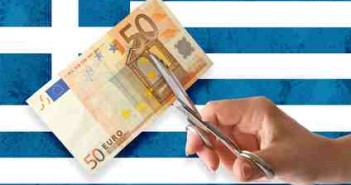The IMF sees a financing hole of 10.9 billion euros for Greece: €4.4 billion this year and €6.5 in the next one. And, the IMF wants euro-zone governments to take “substantial losses†on loans made to Greece, and not for the first time.Â
The news comes at a bad timing for Angela Merkel: she faces re-election on September 22nd. Up to now, German officials have denied a financing gap and made efforts not to rock the boat. This publication further increases the tensions within the troika.
So far, all the euro-zone bailout money came in the form of loans – not grants. After private bondholders already took a haircut through the Private Sector Involvement, most of the debt is held with the IMF, the euro-zone governments and the ECB.
The magic number for the debt-to-GDP ratio has been 120.5% by 2020. The IMF sees the current path leading to 124%. And, it wants the ratio to fall to 110% in 2021. The Fund also reminded everybody of Greece’s depression: an unemployment rate of 27%, youth unemployment of 57% and a drop of 25% in GDP since 2007.
German elections
This report might provide some back wind to the Alternative für Deutschland party. The party has a “single needle in its compassâ€: to get Germany out of the euro-zone, riding on popular anti-euro sentiment. The party might snatch some voters from Merkel’s center-right CDU, but has not been seen as a big threat so far.
So far, Germany hasn’t really paid anything, and the debt crisis actually helped the country pay lower yields in bond markets and enjoy a weaker euro for its exports. Even if German taxpayers do find themselves paying off Greek debt, the benefits of staying in the euro-zone are probably much higher for the zone’s locomotive: it couldn’t have such a strong economy without the euro: German exports would not have been so competitive.
While many Germans acknowledge this, and the country might eventually accept losses, nobody will say it out loud before the elections.
Further reading:Â Worsening Eurozone debt levels could see September Euro sell-off



